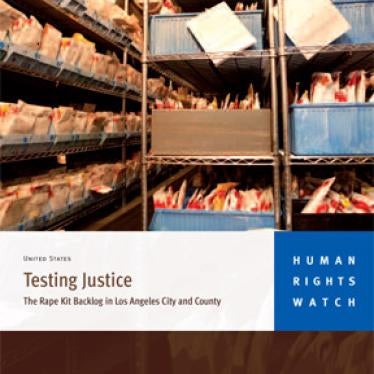Illinois could soon become an unexpected champion of justice for a group too often ignored by police and politicians - rape victims. While popular television dramas (like "Law and Order" and "CSI") routinely portray such women at the center of serious investigations in which the bad guy is identified by scientists working with DNA, the truth is that all too often the DNA evidence in rape cases languishes without examination.
This week, a state senate bill was introduced (SB 3269 - State Senator Toi Hitchinson of Olympia Fields) that would make Illinois the first state in the nation to require law enforcement to send physical evidence taken from a rape victim, known as a "rape kit," to labs for testing. A similar bill is before the House (HB 4765 - Representative Jack Franks of Woodstock). These laws might seem unnecessary - if a rape victim is subjected to an invasive, lengthy procedure to collect physical evidence, surely it will be sent for testing. And yet our research has shown in states across the country - including Illinois, California, Michigan, and Texas - that producing a rape kit is no guarantee that it will be tested.
The House bill mandates that every kit be sent to a lab and tested within 6 months; the Senate bill requires the kits be sent within 10 days, but does not explicitly require that they be tested. The House bill testing requirement depends on whether "sufficient funding and resources are available," with no indication that the bill would provide the necessary resources. Still, both bills go far beyond legislation elsewhere in the US and send Illinois down the road to becoming a model for other states to provide justice to rape victims.
Every year in this country, more than 200,000 people report to the police that they have been raped. Many are asked to submit to the collection of DNA evidence. The benefits are enormous: testing DNA evidence can identify an unknown rapist, confirm the identity of a known assailant, corroborate the victim's account, and exonerate innocent suspects.
But national FBI figures show the arrest rate for rape is at a historic low of 22 percent. In Illinois, it is even lower. In 2008 (the last year for which comprehensive data are available,) 4,118 felony sexual assaults were reported to the police, with only 452 arrests - an arrest rate of 11 percent.
Testing every rape kit is one way to improve those abysmal figures and make the streets of Illinois safer. In 2003, when New York City began testing all kits, the arrest rate skyrocketed, from 40 percent of reported cases to 70 percent. It took a strong mayor and a cooperative police chief to make sure kits were tested in a timely manner, and that results were used to move cases. National studies have shown that cases in which a rape kit was tested and found to contain DNA evidence are more likely to move forward. Conversely, an untested rape kit typically means a rape investigation was cut short before the offender could be prosecuted, depriving a victim of her chance to see justice done.
Although the value of testing rape kits is well-established, many jurisdictions leave them sitting in storage, just like authorities in Illinois. In tracking this issue across the country over the past two years, Human Rights Watch found 12,500 untested kits in Los Angeles alone. Working with local reporters, we discovered 10,500 untested kits in Detroit police storage and another 4,000 in Houston.
In Illinois, we made public records requests to the 100 most populous cities and to every county and interviewed more than 300 people - police, prosecutors, rape victims, and advocates. In the 82 of the 243 jurisdictions that have responded so far, we found that about 4,000 of the 5,000 rape kits delivered to police storage facilities over the past 10 years have yet to be tested - 80 percent.
Good intentions in Illinois have sometimes fallen short. In 2008 and 2009, news reports revealed that money designated for testing rape kits had been used for unrelated purposes. An audit by the Illinois inspector general found that the state had misrepresented the facts in an effort to show that it had eliminated the DNA testing backlog. This is why a bill sending rape kits to crime labs should include an explicit requirement to test each kit and to make law enforcement review the results before closing a case without an arrest.
With so many good reasons to test rape kits, surely any hesitancy on the part of lawmakers to pass this bill will focus mainly on the understandable concern of cost. It's a tough budget year to request extra resources. But can the state afford not to test rape kits? Testing is a fundamental element of the government's obligation to address sexual violence, and women should not pay a heavy price for saving the state money. By passing a bill this session, the General Assembly can send a message to local officials that it will no longer turn a blind eye to rape victims, and that they shouldn't either.







